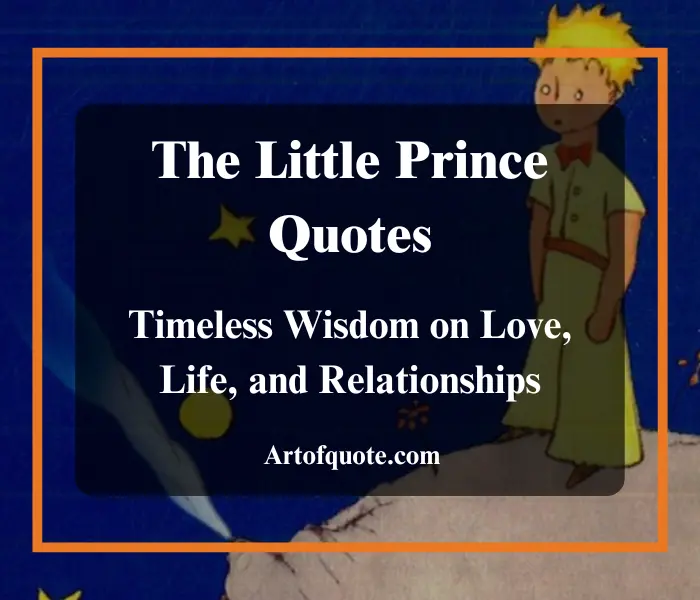“To be, or not to be, that is the question.” This iconic line from Hamlet by William Shakespeare has resonated with readers and audiences for centuries. Hamlet is a rich and complex play that delves into themes of revenge, madness, death, and existentialism, making it a timeless classic in the world of literature. In this article, we’ll explore various Hamlet quotes that provide profound insights into these themes, offering both wisdom and sorrow. Whether you’re an avid Shakespeare fan or encountering his work for the first time, these quotes will deepen your understanding of his enduring genius.
Inside This Post:
Hamlet Quotes
Frailty, thy name is woman! – Hamlet
Explanation: Hamlet’s famous outburst reflects his disillusionment with his mother, Gertrude, following her swift remarriage to his uncle Claudius. It represents his frustration with the perceived weakness of women, a recurring theme in the play.
“This above all: to thine own self be true.”
– Polonius
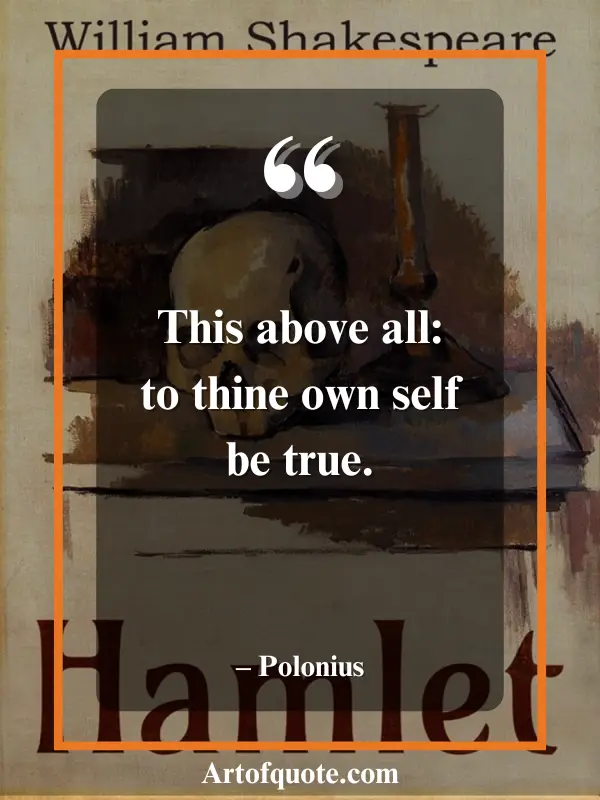
Explanation: Polonius, Hamlet’s advisor, offers this advice to his son Laertes. It speaks to the importance of personal integrity and staying true to one’s values. It’s a quote often remembered for its timeless wisdom on self-awareness.
Something is rotten in the state of Denmark. – Marcellus
Explanation: Marcellus’ observation comes as he and Horatio witness the appearance of the ghost of Hamlet’s father. It foreshadows the political corruption and moral decay that lies at the heart of the tragedy.
Best Hamlet Quotes
To be, or not to be, that is the question. – Hamlet
Explanation: This is undoubtedly one of the most famous and poignant lines in all of Shakespeare’s works. It explores Hamlet’s existential dilemma, questioning the value of life in the face of suffering.
“The lady doth protest too much, methinks.”
– Gertrude
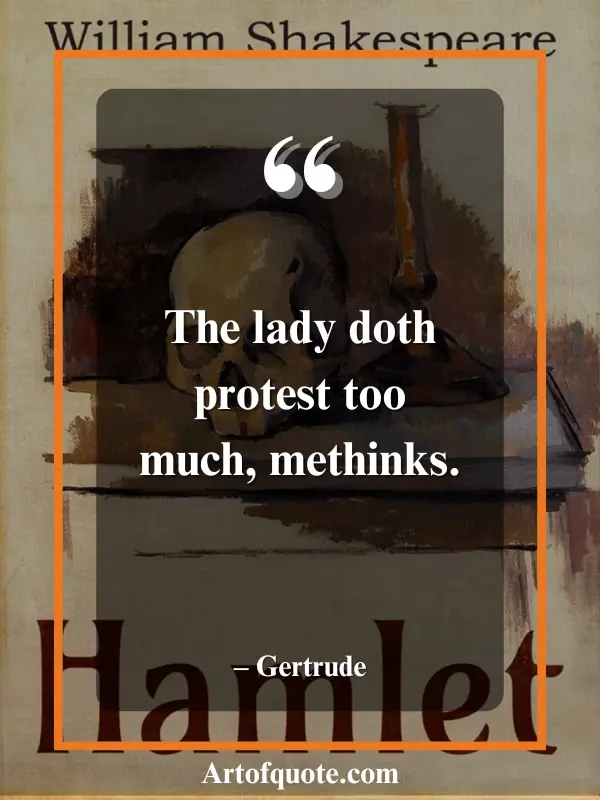
Explanation: Gertrude’s remark during the play-within-a-play scene highlights her own discomfort with the drama unfolding around her. It suggests that excessive protestation may be a sign of guilt.
Give me that man that is not passion’s slave and I will wear him in my heart’s core, ay, in my heart of heart.
– Hamlet
Explanation: Hamlet speaks of the ideal man—one who is free from the tyranny of passion. This speaks to his desire for rationality and control, traits he struggles to maintain throughout the play.
Ophelia in Hamlet Quotes
O, what a noble mind is here o’erthrown! – Ophelia
Explanation: Ophelia reflects on Hamlet’s apparent madness. This quote highlights the tragic irony of Hamlet’s state—once noble, now destroyed by the events around him.
“I was the more deceived.”
– Ophelia
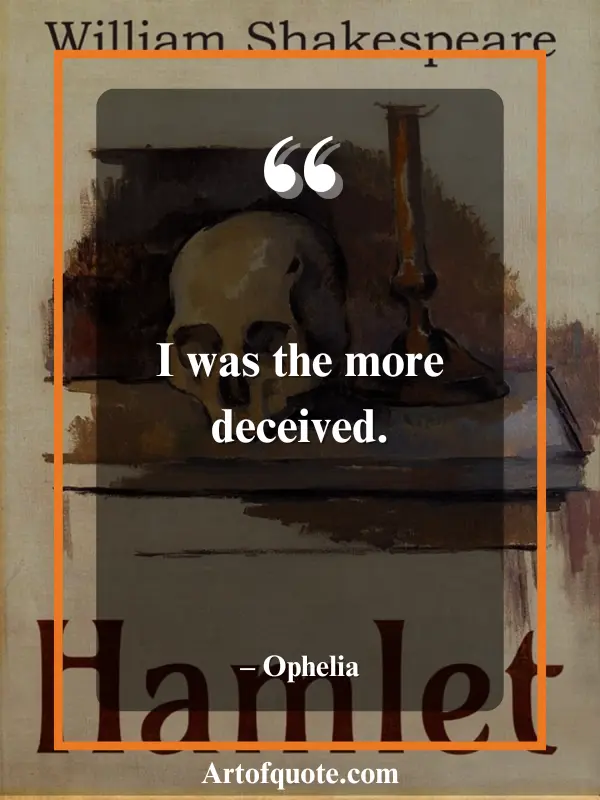
Explanation: Ophelia speaks this line as she reflects on her own heartache, particularly in relation to Hamlet’s cruelty toward her. It reveals her feelings of betrayal.
There’s rosemary, that’s for remembrance; pray, love, remember. – Ophelia
Explanation: Ophelia’s tragic madness manifests in this line, where she hands out flowers symbolizing different emotions, suggesting a deep sorrow and a plea to be remembered.
Revenge Hamlet Quotes
Revenge his foul and most unnatural murder.
– Ghost of King Hamlet
Explanation: This is the command given to Hamlet by the ghost of his father, spurring the entire revenge plot. It underscores the theme of vengeance that drives the play.
“The time is out of joint: O cursed spite, that ever I was born to set it right!”
– Hamlet
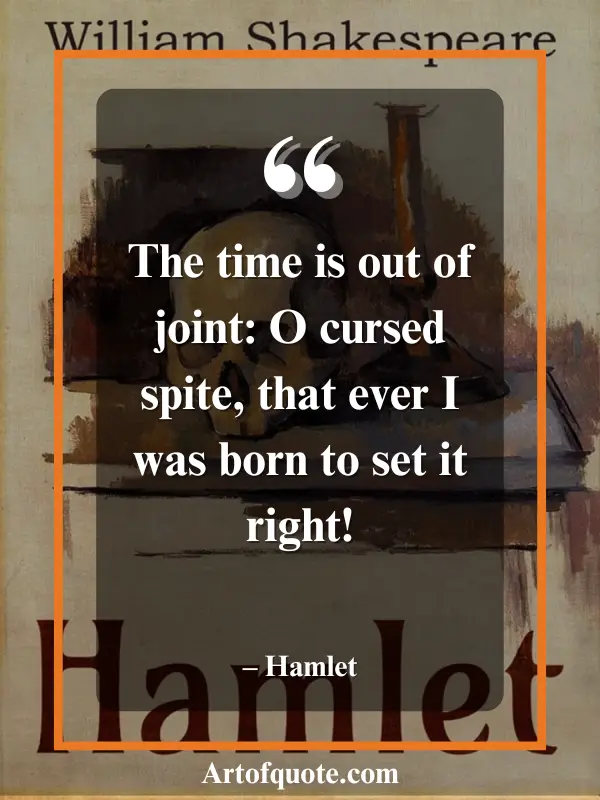
Explanation: Hamlet laments the burden of avenging his father’s death, feeling cursed by his role in setting things right.
Now might I do it pat, now he is praying; And now I’ll do’t. And so he goes to heaven. – Hamlet
Explanation: Hamlet hesitates before killing Claudius, deciding that killing him while he is praying would send his soul to heaven, thus depriving him of true revenge.
Madness in Hamlet Quotes
Though this be madness, yet there is method in it.
– Polonius
Explanation: Polonius remarks upon Hamlet’s apparent madness, realizing that there might be a strategy behind his erratic behavior. This line suggests that Hamlet’s madness is more controlled than it appears.
“I am but mad north-north-west; when the wind is southerly, I know a hawk from a handsaw.”
– Hamlet

Explanation: Hamlet plays with the idea of madness, claiming that while he may appear insane at times, he retains his clarity of thought when necessary.
Get thee to a nunnery! – Hamlet
Explanation: In one of his most famous exchanges with Ophelia, Hamlet’s sharp words are a reflection of his bitterness and disillusionment with women. His command to go to a nunnery symbolizes his rejection of both Ophelia and the world he lives in.
Horatio Hamlet Quotes
What a piece of work is man, how noble in reason, how infinite in faculty. – Hamlet
Explanation: Hamlet’s praise of humanity’s capabilities is paradoxical, given his own dark thoughts on existence. It demonstrates Horatio’s rationality in contrast to Hamlet’s internal struggle.
“There are more things in heaven and earth, Horatio, than are dreamt of in your philosophy.”
– Hamlet

Explanation: Hamlet expresses his belief in the mysterious, the unexplained, and the supernatural, contrasting his own broader understanding of life with Horatio’s more grounded perspective.
But we both obey, and here give up ourselves, In the full bent, to lay our services freely at your feet, to be commanded. – Horatio
Explanation: Horatio remains loyal to Hamlet throughout the play. This quote illustrates his deep loyalty and commitment, a sharp contrast to the betrayal Hamlet experiences.
Important Hamlet Quotes
Give me the man who is not passionate’s slave. – Hamlet
Explanation: Hamlet’s desire for control over his passions is an important theme, illustrating his struggle to maintain rationality while dealing with grief, betrayal, and revenge.
“There is nothing either good or bad, but thinking makes it so.”
– Hamlet
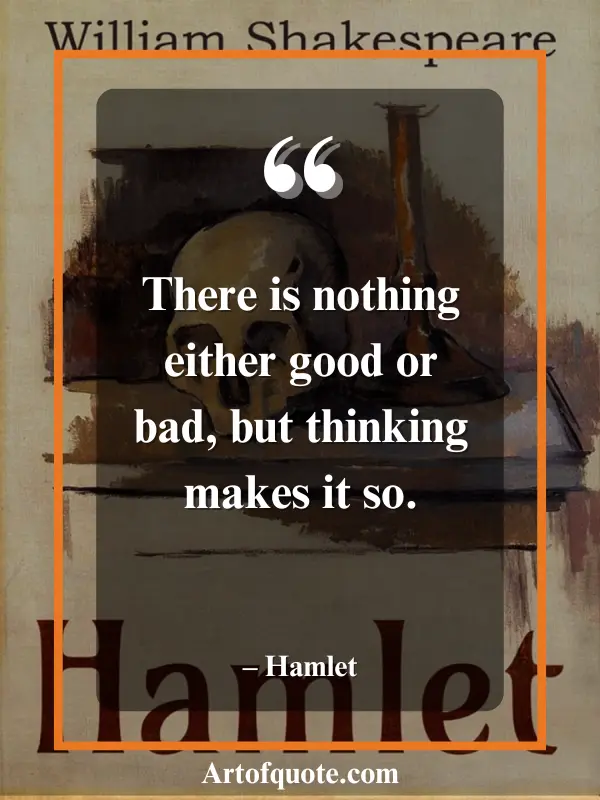
Explanation: Hamlet’s philosophical nature shines through here, showing his belief in the relativity of experience. What one perceives as good or bad is shaped by the individual’s mindset.
Brevity is the soul of wit. – Polonius
Explanation: Polonius, known for his long-winded speeches, ironically offers this piece of advice. The quote itself is a reflection of the play’s theme of deception, where words often mask true intentions.
Hamlet Quotes About Death
Alas, poor Yorick! I knew him, Horatio. – Hamlet
Explanation: Hamlet’s moment of reflection over the skull of Yorick, the court jester, highlights the inevitability of death and the transient nature of life.
“To die, to sleep—no more.”
– Hamlet
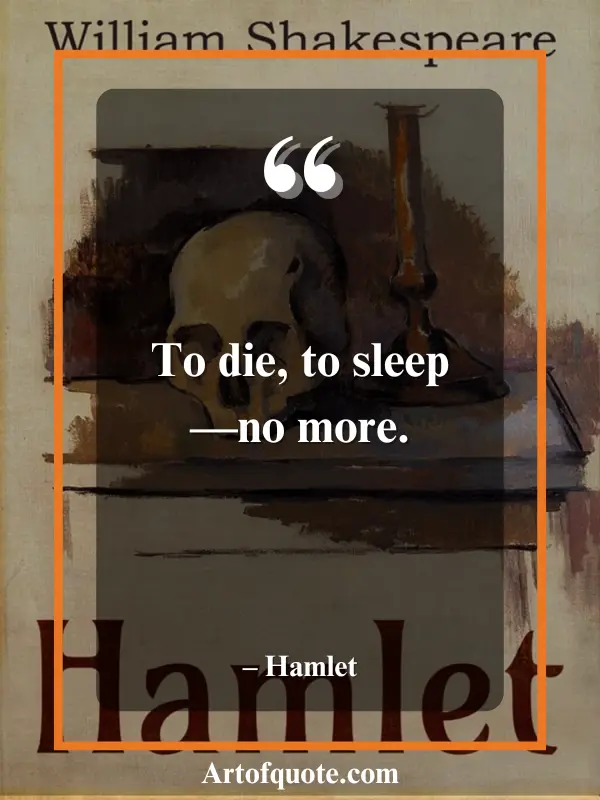
Explanation: Hamlet contemplates the peace of death, seeing it as a kind of eternal sleep without the suffering of life. This line underscores Hamlet’s growing obsession with mortality.
The rest is silence. – Hamlet
Explanation: Hamlet’s final words before his death capture the ultimate mystery of death—silence. It signifies the end of his tumultuous life and the final curtain of the play.
Shakespeare Hamlet Quotes
What is a man, if his chief good and market of his time be but to sleep and feed? – Hamlet
Explanation: Hamlet wrestles with the idea of life’s purpose. He critiques a life spent in mere physical existence, implying that a life without purpose or action is meaningless.
“I am very sorry, good Horatio, that to Laertes I forgot myself, and as my grief has a speech.”
– Hamlet
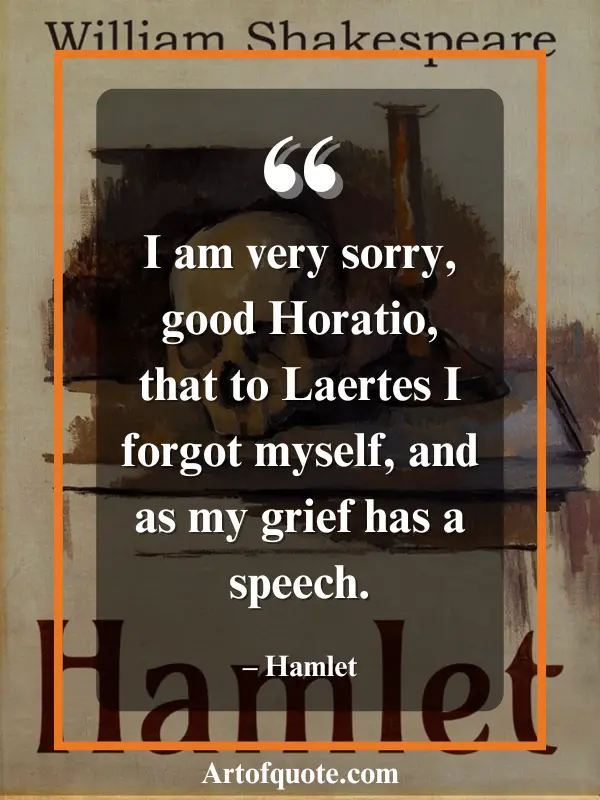
Explanation: Hamlet expresses remorse for his actions and seeks forgiveness from Horatio, showing the theme of regret and the emotional burden that Hamlet carries.
The world is but a stage, and all the men and women merely players. – Hamlet
Explanation: Shakespeare’s exploration of life as a performance reflects the play’s theme of appearance versus reality. It questions the authenticity of human life and the roles individuals are forced to play.
FAQs
One of Hamlet’s most famous quotes is “To be, or not to be, that is the question.” This line reflects Hamlet’s existential pondering about life and death, making it one of the most iconic quotes in English literature.
There is nothing either good or bad, but thinking makes it so.” This smart quote from Hamlet demonstrates his philosophical nature, emphasizing that our perceptions shape the reality we experience.
Hamlet’s final line is “The rest is silence.” These words are spoken just before his death, encapsulating the mystery and finality of death, which is a central theme throughout the play.
Wrap-up
The Hamlet quotes we’ve explored in this article show how Shakespeare’s work still holds immense value today. Each quote reflects the inner turmoil, philosophical reflections, and emotional struggles faced by the characters. By understanding these Hamlet quotes, we can gain a deeper appreciation of Shakespeare’s portrayal of human nature. To dive deeper into the text and explore more of these memorable lines, check out additional resources on Shakespeare’s Hamlet here. Remember, these quotes not only reflect the era in which they were written but also speak to universal truths that transcend time.
- Top Brandon Sanderson Quotes to Inspire and Amaze You - February 5, 2025
- Boost Your Day with Powerful Monday Morning Quotes - January 31, 2025
- Inspiring Saturday Quotes to Kickstart Your Weekend! - January 30, 2025


